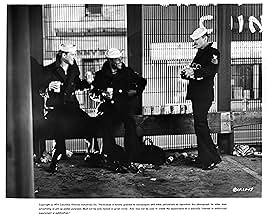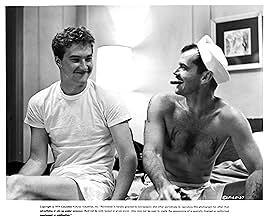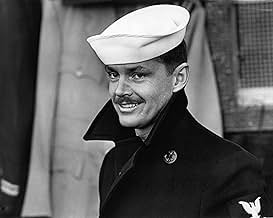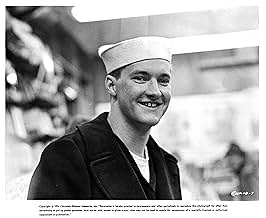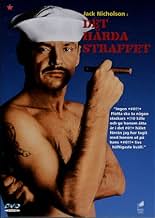IMDb रेटिंग
7.5/10
30 हज़ार
आपकी रेटिंग
दो नौसेना पुरुषों को एक युवा अपराधी को जेल में लाने का आदेश दिया जाता है, लेकिन रास्ते में उसे एक आखिरी अच्छा समय दिखाने का फैसला किया जाता है.दो नौसेना पुरुषों को एक युवा अपराधी को जेल में लाने का आदेश दिया जाता है, लेकिन रास्ते में उसे एक आखिरी अच्छा समय दिखाने का फैसला किया जाता है.दो नौसेना पुरुषों को एक युवा अपराधी को जेल में लाने का आदेश दिया जाता है, लेकिन रास्ते में उसे एक आखिरी अच्छा समय दिखाने का फैसला किया जाता है.
- 3 ऑस्कर के लिए नामांकित
- 6 जीत और कुल 9 नामांकन
Patricia Hamilton
- Madame
- (as Pat Hamilton)
फ़ीचर्ड समीक्षाएं
Jack Nicholson is a performer with the rare ability to completely immerse himself in a chosen role and convince the audience of the stark reality of his performance. Playing Navy Signalman First Class Billy "Badass" Buddusky in Hal Ashby's 1973 film rendition of Darryl Ponicsan's novel, "The Last Detail" is a sterling example of that uncommon talent. Rough-edged but understanding, crude but compassionate, Buddusky and fellow "lifer" Gunner's Mate First Class "Mule" Mulhall (skillfully portrayed by Otis Young) are "detailed" as armed Shore Patrol guards to escort a young sailor, Larry Meadows (Randy Quaid) from Norfolk, Va. to a naval prison in Portsmouth, NH in order to serve an eight-year sentence after being convicted at a court-martial of petty theft.
The five-day journey northward is an adventure for all three. Sympathizing with Meadows's plight, apprised of his utter naivete and realizing his sentence far exceeds the severity of the offense, Buddusky and Mulhall conduct their version of a cram course in traditional male rights of passage--ranging from a drunken spree in Washington, D.C. to duking it out with Marines in New York City and getting their charge sexually initiated with a Boston prostitute--if for no other reason than to give him some taste of what he will not be experiencing for a long time and to teach him in some small way to assert himself as an individual.
Darryl Ponicsan's novel (which hit the racks at practically the same time the film had been released--the book's ending is quite different and, to me, is much less believable than the film's) was initially hailed as a polemic against what many believed was the cold indifference of the military establishment. However, since that time, it has been judged more a compelling "slice of life" drama about the complexities of everyday human behavior and how it is shaped by our own decisions and by entities beyond our immediate purview. And, more importantly, it forces us to think about how our ever-more-complicated society is increasingly unable to find ways to help its young people constructively mark transition into adulthood.
"The Last Detail" is a sadly overlooked but superb blend of pathos, ribald bittersweet humor, hard-edged '70s realism and insightful and subtle human drama, one that brashly and subtly brought back many personal memories of my Navy hitch and a work that says something to all of us by merely focusing upon a small "detail" of a sadly overlooked and unappreciated decade that was alternately (and simultaneously) bleak yet hopeful.
The five-day journey northward is an adventure for all three. Sympathizing with Meadows's plight, apprised of his utter naivete and realizing his sentence far exceeds the severity of the offense, Buddusky and Mulhall conduct their version of a cram course in traditional male rights of passage--ranging from a drunken spree in Washington, D.C. to duking it out with Marines in New York City and getting their charge sexually initiated with a Boston prostitute--if for no other reason than to give him some taste of what he will not be experiencing for a long time and to teach him in some small way to assert himself as an individual.
Darryl Ponicsan's novel (which hit the racks at practically the same time the film had been released--the book's ending is quite different and, to me, is much less believable than the film's) was initially hailed as a polemic against what many believed was the cold indifference of the military establishment. However, since that time, it has been judged more a compelling "slice of life" drama about the complexities of everyday human behavior and how it is shaped by our own decisions and by entities beyond our immediate purview. And, more importantly, it forces us to think about how our ever-more-complicated society is increasingly unable to find ways to help its young people constructively mark transition into adulthood.
"The Last Detail" is a sadly overlooked but superb blend of pathos, ribald bittersweet humor, hard-edged '70s realism and insightful and subtle human drama, one that brashly and subtly brought back many personal memories of my Navy hitch and a work that says something to all of us by merely focusing upon a small "detail" of a sadly overlooked and unappreciated decade that was alternately (and simultaneously) bleak yet hopeful.
Though the film's storyline diverges from the more existential theme of the Darryl Ponicsan novel from which it was adapted, 'The Last Detail' was, is, and remains the only real deal film about navy enlisted men. Hollywood never did sailors so well as it does them here.
If you don't care for testosterone-impelled behavior, parochial esprit de corps, scatology, and profanity - well, never mind: the dialogue here is true-to-life sailorese, and the hi- and low-jinks antics are too. If you can't take the heat, get the hell out of the galley.
Gritty cinematography of the earthy, low-rent world of enlisted sailors (for example, watching the "decent peoples' world" pass by the filth-streaked windows of a worn, smelly railway car) communicates much of the characters' experience of life in the margins and their ethos and how they came by them. The Johnny Mandel score is often oddly, and too-cheerfully irrelevant, though one suspects its breezy take on nautical marches and ditties was meant to be satirical; but it's often discordant with the serious themes - 'the individual versus society', existential choice and haplessness - of 'The Last Detail'.
In a role that could have been tailor-made for him Jack Nicholson's acting is perhaps the best of his career - a superior foreshadowing of his later turn in 'One Flew Over the Cuckoo's Nest'. But without Otis Young as his fellow seasoned petty officer and Randy Quaid as the naive young, brig-bound seaman, Nicholson's tour de force would have fallen as flat as a flathat (for all you landlubbers: the navy blue "Donald Duck" US NAVY-ribbon bound winter sailors' hats, which sailors hated intensely, that were abolished in the early 60's).
Politically correct left-leaning folks should discover in Gunners Mate 1st Class "Mule" Mulhall a perfect example of an African American professional sailor: serious yet fun-loving; jocular but no-nonsense; competent and quietly self-assured: in short, a sailor among sailors, a man among men. I know because I served, and when the chips were up or down no sailor cared about color, and each of us cared only that he or she could rely, or not, on our shipmates. Though it has its arcane rules, written and unwritten, the naval service is remarkably egalitarian in opportunity - and it is so without all the hue and cry of civilian "social consciousness".
Though it's a marvel of a film, 'The Last Detail' could not cram into its running time all the humor and pathos of the eponymous, tough-tender Ponicsan novel (in which petty officer Mulhall's character looms quite a bit larger than he does in the movie, and Billy Buddusky's reflexive resorting to signalling with his Signalman's semaphoring hands spells out apt clues to his worldview); and the novel (which, incidentally, I read while on active duty, before the film had been made) turns out with a dramatically different ending - with a true denouement absent from the screenplay's conclusion that left me wanting, and which is the film's only grave, if quibbling, flaw. But the screenplay incorporates characters, scenes (Carol Kane as the careworn young whore providing Quaid's Seaman Meadows his first experience of coupling), and dialogue that might also have helped the novel to better flesh out and plumb the characters and their experience. Small matter, really: the book and the film contrast and complement each other perfectly.
Anyone considering enlistment should see 'The Last Detail' because it tells enlisted sailors' life like it is. If you can take life like it is, with or without the occasional fix ('An Officer and a Gentleman' anyone?) of kitschy, unrealizable romantic fantasy, then 'The Last Detail' is your meat.
The Real Deal. Chow Call, Chow Call - All hands lay to the messdeck! Take all you want - Eat all you take. Down to 'The Last Detail'.
If you don't care for testosterone-impelled behavior, parochial esprit de corps, scatology, and profanity - well, never mind: the dialogue here is true-to-life sailorese, and the hi- and low-jinks antics are too. If you can't take the heat, get the hell out of the galley.
Gritty cinematography of the earthy, low-rent world of enlisted sailors (for example, watching the "decent peoples' world" pass by the filth-streaked windows of a worn, smelly railway car) communicates much of the characters' experience of life in the margins and their ethos and how they came by them. The Johnny Mandel score is often oddly, and too-cheerfully irrelevant, though one suspects its breezy take on nautical marches and ditties was meant to be satirical; but it's often discordant with the serious themes - 'the individual versus society', existential choice and haplessness - of 'The Last Detail'.
In a role that could have been tailor-made for him Jack Nicholson's acting is perhaps the best of his career - a superior foreshadowing of his later turn in 'One Flew Over the Cuckoo's Nest'. But without Otis Young as his fellow seasoned petty officer and Randy Quaid as the naive young, brig-bound seaman, Nicholson's tour de force would have fallen as flat as a flathat (for all you landlubbers: the navy blue "Donald Duck" US NAVY-ribbon bound winter sailors' hats, which sailors hated intensely, that were abolished in the early 60's).
Politically correct left-leaning folks should discover in Gunners Mate 1st Class "Mule" Mulhall a perfect example of an African American professional sailor: serious yet fun-loving; jocular but no-nonsense; competent and quietly self-assured: in short, a sailor among sailors, a man among men. I know because I served, and when the chips were up or down no sailor cared about color, and each of us cared only that he or she could rely, or not, on our shipmates. Though it has its arcane rules, written and unwritten, the naval service is remarkably egalitarian in opportunity - and it is so without all the hue and cry of civilian "social consciousness".
Though it's a marvel of a film, 'The Last Detail' could not cram into its running time all the humor and pathos of the eponymous, tough-tender Ponicsan novel (in which petty officer Mulhall's character looms quite a bit larger than he does in the movie, and Billy Buddusky's reflexive resorting to signalling with his Signalman's semaphoring hands spells out apt clues to his worldview); and the novel (which, incidentally, I read while on active duty, before the film had been made) turns out with a dramatically different ending - with a true denouement absent from the screenplay's conclusion that left me wanting, and which is the film's only grave, if quibbling, flaw. But the screenplay incorporates characters, scenes (Carol Kane as the careworn young whore providing Quaid's Seaman Meadows his first experience of coupling), and dialogue that might also have helped the novel to better flesh out and plumb the characters and their experience. Small matter, really: the book and the film contrast and complement each other perfectly.
Anyone considering enlistment should see 'The Last Detail' because it tells enlisted sailors' life like it is. If you can take life like it is, with or without the occasional fix ('An Officer and a Gentleman' anyone?) of kitschy, unrealizable romantic fantasy, then 'The Last Detail' is your meat.
The Real Deal. Chow Call, Chow Call - All hands lay to the messdeck! Take all you want - Eat all you take. Down to 'The Last Detail'.
Often regarded as a comedy-drama, 'The Last Detail' always stood out to me as a pure drama. It tells the story involving a group of Navy officers: a young and meek officer (Randy Quaid) steals some money but gets caught; the two others (Jack Nicholson and Otis Young) are to take him to prison. They (especially Nicholson) get somewhat attached to the boy when they see how young (ie.: don't know much of the world) and weak he is and decide to show him how to be a man before putting him away.
A look at the cast/crew shows how promising the film is. Hal Ashby is a fine director, whose films I always like/love (except maybe for 'Coming Home', which often gets too preachy and melodramatic); the screenplay is done by Robert Towne, the same guy who would later do 'Chinatown'; and the leading actor is Jack Nicholson, one of cinema's greatest actors.
Speaking of Jack Nicholson, he is just brilliant here. His character, 'Bad-Ass' Buddusky, is the type of character he is at best with: sarcastic and irreverent even when serious, yet very smart and caring in his own way. He acts as a father figure for the young Meadows (Quaid), trying to lift his mood and have him something to remember and be happy before having to face the harsh conditions of prison. Quaid and Young, alongside the supporting characters, end up overshadowed by Nicholson's performance, but they too make a great work with their characters.
As typical of a 70's and/or Hal Ashby film, 'The Last Detail' has great photography and is strangely comfortable to look at. The movie is very realistic too, with both situations and characters being very believable and sympathetic. The characters are very fleshed out and developed, making it difficult not to like or remain indifferent towards them. I've also heard that the way Navy/Marine officers are portrayed are also very close to the real thing, without forcing their portrayal as a way of criticism of the armed forces, which many directors would jump at the chance to do (specially considering the time this movie was made). In truth, I didn't feel that the film was a critique of the military like many say.
My only complaint on the movie is that it's supposed to be a comedy too. Yes, there are awkward situations and Jack Nicholson's typical rebellious way of dealing with everything; but the movie tends to make them more interesting than actually funny. Not that I'm saying this is bad; 'The Last Detail' is a remarkable movie in every aspect and one of the best pure dramas I've seen.
A look at the cast/crew shows how promising the film is. Hal Ashby is a fine director, whose films I always like/love (except maybe for 'Coming Home', which often gets too preachy and melodramatic); the screenplay is done by Robert Towne, the same guy who would later do 'Chinatown'; and the leading actor is Jack Nicholson, one of cinema's greatest actors.
Speaking of Jack Nicholson, he is just brilliant here. His character, 'Bad-Ass' Buddusky, is the type of character he is at best with: sarcastic and irreverent even when serious, yet very smart and caring in his own way. He acts as a father figure for the young Meadows (Quaid), trying to lift his mood and have him something to remember and be happy before having to face the harsh conditions of prison. Quaid and Young, alongside the supporting characters, end up overshadowed by Nicholson's performance, but they too make a great work with their characters.
As typical of a 70's and/or Hal Ashby film, 'The Last Detail' has great photography and is strangely comfortable to look at. The movie is very realistic too, with both situations and characters being very believable and sympathetic. The characters are very fleshed out and developed, making it difficult not to like or remain indifferent towards them. I've also heard that the way Navy/Marine officers are portrayed are also very close to the real thing, without forcing their portrayal as a way of criticism of the armed forces, which many directors would jump at the chance to do (specially considering the time this movie was made). In truth, I didn't feel that the film was a critique of the military like many say.
My only complaint on the movie is that it's supposed to be a comedy too. Yes, there are awkward situations and Jack Nicholson's typical rebellious way of dealing with everything; but the movie tends to make them more interesting than actually funny. Not that I'm saying this is bad; 'The Last Detail' is a remarkable movie in every aspect and one of the best pure dramas I've seen.
The Last Detail by Hal Ashby is much like John Schlesinger's Midnight Cowboy in that they are both road trip movies as well as buddy movies. They are about friendships that forged in extreme circumstances and the effect that these experiences have on each character's lives.
In the last detail, an unfortunate seaman by the name of Meadows (Randy Quaid) is condemned to jail for eight years for a misdemeanor crime he was unable to even complete. Being caught with his hand in the cookie jar after a mere forty dollars, he is consequently transported from a naval base in the south to the naval prison in Portsmouth, Maine. The last detail of a few veteran naval officers, namely Billy "Bad Ass" Buddusky (Jack Nicholson) and "Mule" Mulhall (Otis Young) is to transport this eighteen year old, soon to be prisoner up the east coast.
The three gentlemen have never met before and all seem to have different interests. Billy and Mule are after some welcomed time off from the suffocating life on the naval base, while Meadows is drowning in his own depression. Billy is more of a lenient presence, while Mule seems to want to do his duty first and then relax. Soon the men form a bond. This bond and their relationship is what carry the movie. Meadows is an innocent and modest teenager who found his way into the navy because of a shop lifting problem. However, after hearing his story and spending time with the boy, the two officers realize the ludicrous charges that have been brought against such an undeserving soldier.
They take pity on him and decide to make his last days of freedom ones in which he will cross every right of passage yet to be undiscovered and make them days that he will never forget. As they gradually open up to each other, they grant the prisoner a certain degree of freedom beginning with the removal of the cuffs in the beginning of the movie. They get him drunk in Washington, D.C., involve him in his first fist fight in New York City and help him lose his virginity in Boston. Beyond these rights of passage, the officers also relate to the emotional side of Meadows. They allow him to visit his mother. What the two officers did not realize is that the journey they would take would be reciprocal. They all end up taking their guard down.
One of the more poignant lines in the film is when Meadows refers to the officers as his beast friends. Although he has only known them for less than a week, the sad fact is that these men are probably the closest friends that he has ever had. Mule and Billy have had much more life experience and are well versed in the details and idiosyncrasies that life involves. They connect with meadows because before this trip, he had been yet untouched by the worse side of life. His general doe eyed demeanor drives home the fact that he really does not deserve the treatment that he's receiving. Upon leaving the prison, I don't believe that Mule and Billy are so much angry with the way the ascending officer treated them as they are with the situation that Meadows is now faced with. "We could have prevented this.
In the last detail, an unfortunate seaman by the name of Meadows (Randy Quaid) is condemned to jail for eight years for a misdemeanor crime he was unable to even complete. Being caught with his hand in the cookie jar after a mere forty dollars, he is consequently transported from a naval base in the south to the naval prison in Portsmouth, Maine. The last detail of a few veteran naval officers, namely Billy "Bad Ass" Buddusky (Jack Nicholson) and "Mule" Mulhall (Otis Young) is to transport this eighteen year old, soon to be prisoner up the east coast.
The three gentlemen have never met before and all seem to have different interests. Billy and Mule are after some welcomed time off from the suffocating life on the naval base, while Meadows is drowning in his own depression. Billy is more of a lenient presence, while Mule seems to want to do his duty first and then relax. Soon the men form a bond. This bond and their relationship is what carry the movie. Meadows is an innocent and modest teenager who found his way into the navy because of a shop lifting problem. However, after hearing his story and spending time with the boy, the two officers realize the ludicrous charges that have been brought against such an undeserving soldier.
They take pity on him and decide to make his last days of freedom ones in which he will cross every right of passage yet to be undiscovered and make them days that he will never forget. As they gradually open up to each other, they grant the prisoner a certain degree of freedom beginning with the removal of the cuffs in the beginning of the movie. They get him drunk in Washington, D.C., involve him in his first fist fight in New York City and help him lose his virginity in Boston. Beyond these rights of passage, the officers also relate to the emotional side of Meadows. They allow him to visit his mother. What the two officers did not realize is that the journey they would take would be reciprocal. They all end up taking their guard down.
One of the more poignant lines in the film is when Meadows refers to the officers as his beast friends. Although he has only known them for less than a week, the sad fact is that these men are probably the closest friends that he has ever had. Mule and Billy have had much more life experience and are well versed in the details and idiosyncrasies that life involves. They connect with meadows because before this trip, he had been yet untouched by the worse side of life. His general doe eyed demeanor drives home the fact that he really does not deserve the treatment that he's receiving. Upon leaving the prison, I don't believe that Mule and Billy are so much angry with the way the ascending officer treated them as they are with the situation that Meadows is now faced with. "We could have prevented this.
If you respond to this film, you will probably go all the way and love it as much as I do. It is probably the high point of the drama of social realism started back by the like of "Marty."
It is Nicholson's film, yet Quaid and Otis Young(in his only good movie) really shine as well. It is the most heartbreaking of material played without sap or sentiment. Obscenity like this was still pretty new to movies back in 73, be sure to avoid edited T.V. versions. Reading the comments, it is sad that todays movie fans, spoonfed sledgehammer crappola, really can't respond to a drama played with the kind of subtle grace of "The Last Detail." Give it a shot. Ten out of ten.
It is Nicholson's film, yet Quaid and Otis Young(in his only good movie) really shine as well. It is the most heartbreaking of material played without sap or sentiment. Obscenity like this was still pretty new to movies back in 73, be sure to avoid edited T.V. versions. Reading the comments, it is sad that todays movie fans, spoonfed sledgehammer crappola, really can't respond to a drama played with the kind of subtle grace of "The Last Detail." Give it a shot. Ten out of ten.
क्या आपको पता है
- ट्रिवियाThe script was completed in 1970 but contained too much profanity to be shot as written. Columbia Pictures waited for two years trying to get writer Robert Towne to tone down the language. Instead, by 1972, the standards for foul language relaxed so much that all the profanity was left in.
- गूफ़The MAA Master Chief is not wearing a Master-at-Arms rating badge; he is wearing a Boatswain mate rating badge.
The Master At Arms rating was disestablished in 1921, but was officially re-established on 1 August 1973. Therefore, as the story takes place, a Master Chief Boatswain's Mate being assigned the collateral duty of MAA is entirely accurate.
- साउंडट्रैकNever Let The Left Hand Know
by Jack Goga
टॉप पसंद
रेटिंग देने के लिए साइन-इन करें और वैयक्तिकृत सुझावों के लिए वॉचलिस्ट करें
- How long is The Last Detail?Alexa द्वारा संचालित
विवरण
- रिलीज़ की तारीख़
- कंट्री ऑफ़ ओरिजिन
- आधिकारिक साइटें
- भाषा
- इस रूप में भी जाना जाता है
- El último deber
- फ़िल्माने की जगहें
- उत्पादन कंपनियां
- IMDbPro पर और कंपनी क्रेडिट देखें
बॉक्स ऑफ़िस
- बजट
- $23,00,000(अनुमानित)
इस पेज में योगदान दें
किसी बदलाव का सुझाव दें या अनुपलब्ध कॉन्टेंट जोड़ें



